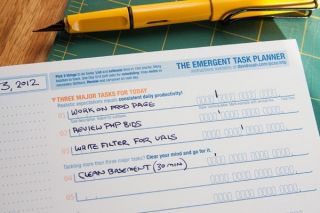How to Beat Procrastination: Obsession with Productivity
I can’t give this an absolute date, but it must have been at least eight or more years ago that I became obsessed with “productivity.” Before long I discovered “GTD,” or “Getting Things Done,” the productivity system (and book title) developed by David Allen and turned into a hugely successful enterprise. The principles are fairly straightforward and simple and I’ll mention a few: Make a written list of absolutely everything that you need to do or think you need to do, or that you someday might want to do. Everything that has your attention or that you think should have your attention. That’s called a “mind dump.” In the same spirit, gather everything material that you need to deal with into an “in-box.” Things that are too big the in-box, for example the hall closet –write “hall closet” on a piece of paper and add it to the long brain-dump list. This project is enormous for most of us, in fact for me it was impossible. I tried. I even put a picture of my living room as an in-box up on a blog I was writing at the time (“Process Notes”).

Implementing GTD: My personal In-box
Despite failure to gather everything, I pushed ahead using GTD as my main system of organization, taking the lists and organizing them into projects and then into very concrete “Next Actions” or behavioral things to do, according to my location, what person or piece of equipment is required, what’s most important, what’s urgent, etc. Meanwhile I got into the serious time-sucking habit of reading numerous productivity blogs out on the Internet. I became addicted to productivity porn so to speak.
While implementing GTD, I was trying out every new computerized system for GTD –and believe me there were hundreds being developed at an exponential rate—as well as every paper planning system that GTDers on the blogosphere spoke highly of. Right now I’m deliberating –compulsively– about which (of three) paper planning and scheduling system I should use. I still try out new GTD/productivity computer-based programs, although perhaps out of sheer laziness I return to Omnifocus, which I’ve been using for at least three years now. I don’t know why I want to use both a computer program and a paper-based system to keep track of all appointments and all those things I have to do or want to do. I guess its simply too hard to write information down on the fly on my computer (like a phone number I hear on a voice mail left in my voice mail “inbox.”) and it’s too hard to copy the link to a blog or article I want to send out to someone or somewhere, in a paper based system.

Dave Seah’s Emergent Task Planner (davidseah.com)
So I have my reasons. This whole venture was –and to be honest, I should say “is” putting that in the present tense—a great deal of fun and relaxing and it was and is all about trying to beat the monster that is procrastination.
There’s an interesting piece by Anna Della Subin in the New York Times today on the topic of procrastination, including some details of a whole conference devoted to it, and attended by what sounds like a list of academic and independent artist-type luminaries. The message is simple; procrastination is a part of our culture because we have the belief that we’re supposed to be productive every moment of every day, an idea that began to creep into the culture with the industrial revolution, and has escalated since into a major source of guilt, shame and feeling like a loser or “unproductive.” As a big-time procrastinator addicted to productivity blogs and linkedin groups on topic, I have spent years looking for every possible cure, for what now seems, is not an illness at all but is a function of being a knowledge worker –or anyone really– in our contemporary culture. I’ve hesitated to blog about my ventures in the world of productivity thinking it’s of little interest to most, and it’s not a guilt-inducing problem. Wrong. I walk around guilty about what I’ve failed to do today, everyday, and I have tons of “anecdotal” data from the vast majority of my students, my clients, and people who consult with me about one thing or another. A few fall into the category of “pre-crastinator” meaning they obsessively get everything done ahead of time, but this definitely fails to define most of us.
I come away with new and creative ideas on “how to beat” procrastination that I pass on to anyone who wants to know and I guess I’ll start writing about them although this might be stoking the fire of the problem by joining the forces that call it a problem. As a psychologist it might be more helpful to write about how to meditate, how to meet new friends if you’re over the age of 40, how to negotiate dating sites without despair and massive disappointment. Instead I’ll give in and write about my own obsessive quest for the perfect paper system, the perfect computer based program in the quest for productivity, the more eloquent euphemism covering up the real issue for most, how to beat procrastination. I’ll end with one really short and simple method, the first I learned from 43 Folders (Merlin Mann’s early blog on topic), the “10 minute dash.” If I can just get myself to focus on that thing I’m avoiding for 10 minutes, I’ll probably go on and do the whole thing. Try the 10-minute dash and let me know if it works for you. Meanwhile I’ll try to stop obsessing about which of 3 paper systems I’m going to use –at least for the next few months, before I feel the need to investigate another perfect paper system. And here’s a great site that just caught my attention, a GTD Times collection of productivity hacks.
